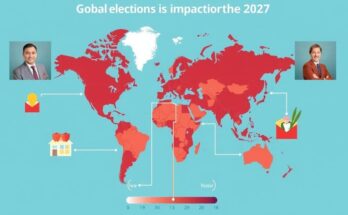Namibia may elect its first female president, Netumbo Nandi-Ndaitwah, in elections on November 27, 2024. With 15 parties contesting and about half the population registered to vote, SWAPO faces challenges after losing its majority in 2019 amid corruption allegations. Nandi-Ndaitwah focuses on employment and women’s issues in her campaign.
Namibia is on the verge of potentially electing its first female president in the forthcoming elections scheduled for Wednesday, November 27, 2024. The vice president, Netumbo Nandi-Ndaitwah, from the South West Africa People’s Organization (SWAPO), leads in early polls. Approximately 1.4 million registered voters, comprising nearly half the nation’s population, will participate in these elections where 15 political parties are contesting for leadership positions.
SWAPO, which has held power since Namibia’s independence in 1990, is facing significant challenges following a decline in its electoral dominance, particularly after losing its two-thirds majority in the National Assembly in 2019. This decline has been linked to corruption scandals within the government, particularly in the fishing sector. Political analysts emphasize the importance of engaging younger voters who are disconnected from the party’s historical ties, suggesting that future electoral success will hinge on tangible governance outcomes rather than emotional appeals.
The challenges of high unemployment, especially among youth, and pressing women’s issues such as reproductive rights and workplace equality are focal points of Nandi-Ndaitwah’s campaign. She has promised a substantial investment aimed at creating hundreds of thousands of jobs, a goal met with skepticism by some experts. Should she succeed, she would make history by joining a trail of female leaders in Africa, following the likes of Ellen Johnson Sirleaf of Liberia and Joyce Banda of Malawi.
With competition from other parties, such as the Independent Patriots for Change and the Affirmative Repositioning party, the political landscape in Namibia is dynamic. The recent political shifts in the region, including setbacks for established parties in neighboring countries, add further complexity to the electoral landscape. The outcome of this election may not only reshape Namibia’s governance but also influence the broader Southern African political environment.
The prospect of electing a female president in Namibia comes at a time of significant political transformation. The country’s ruling party, SWAPO, has faced a decline in its electoral support due to corruption scandals and a failure to resonate with the younger generation, who prioritize accountability and governance over historical allegiance. As more political parties vie for power, the upcoming election presents an unprecedented opportunity for female leadership in a region traditionally dominated by male leaders. The implications of this election extend beyond Namibia, reflecting shifts in political priorities and governance styles across Southern Africa.
In summary, Namibia stands at a pivotal moment in its political history with the possibility of electing its first female president. The outcome will reflect the public’s response to SWAPO’s historical governance, the party’s ability to engage younger voters, and the demand for accountability and job creation. The election’s results may also have ripple effects on the political dynamics within the larger Southern African context, where established parties are experiencing significant electoral challenges.
Original Source: apnews.com




